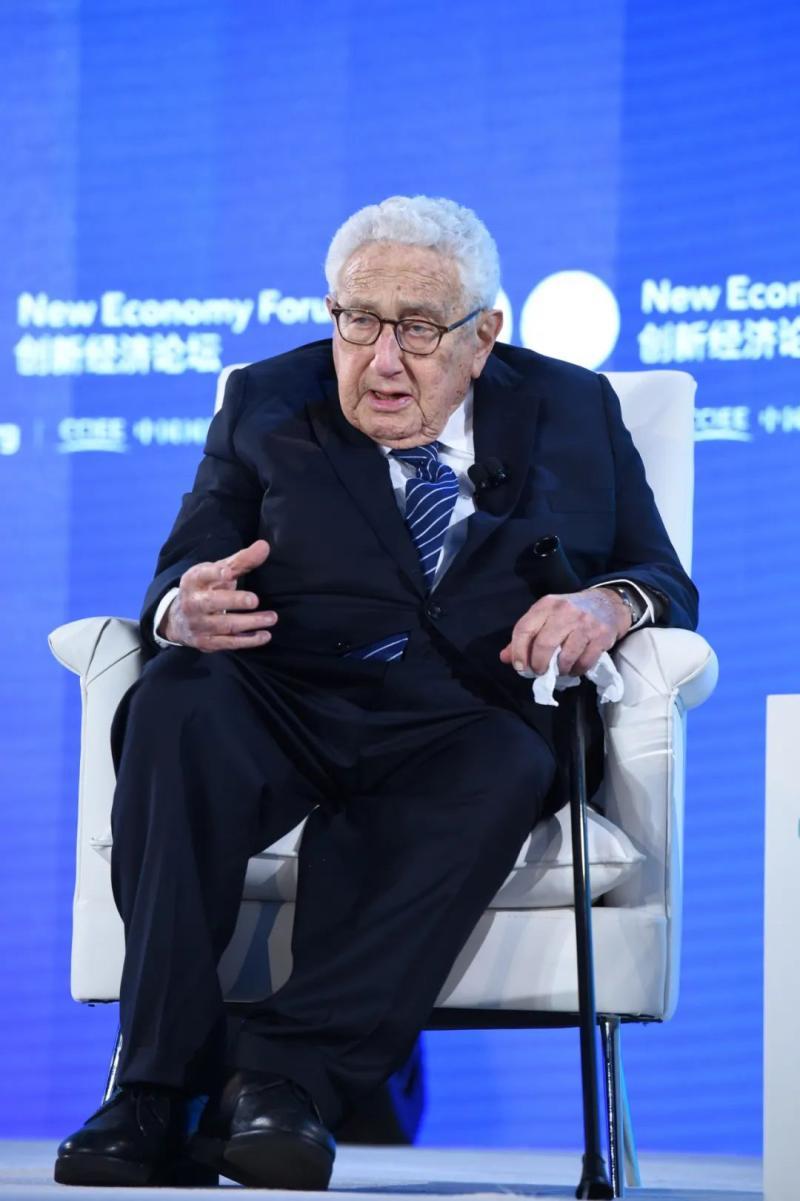Henry Kissinger, who formerly served as United States Secretary of State, will turn 100 on May 27th.
As a witness to the thaw in China-US relations, Kissinger is an indispensable figure in the history of China-US relations.
In 1971, the 48-year-old US National Security Advisor paid a secret visit to China, laying the groundwork for former US President Nixon's visit to China and the subsequent establishment of diplomatic relations between China and the United States.
For the next half-century, Kissinger traveled back and forth between China and the United States hundreds of times.
This politically wise and experienced centenarian has constantly considered China-US relations.
How can the current low point in China-US relations stabilize after establishing diplomatic ties? What insights can we gain from Kissinger's experience?

First, the cooperation potential between China and the United States remains huge from a strategic perspective, which was acknowledged by the Biden administration.
More than 50 years ago, on the then Cold War basis, Kissinger helped the United States design a policy of "balance of power in diplomacy" and promoted the reconciliation between China and the United States with Nixon. The China-Soviet split also led China to adjust its foreign policy and begin engaging with the United States. Back to today, China and the United States share broad areas for cooperation in economic and trade exchanges, promoting economic recovery, infrastructure construction, and addressing climate change. Therefore, improving China-US relations is in the interests of both countries and is consistent with the trend of history.
Second, the problem in terms of the leadership will is whether the Biden administration musters the political courage of Nixon back then.
Before Kissinger's secret visit to China in 1970, the Chinese government issued a harshly worded condemnation of the US invasion of Cambodia and even suspended ambassadorial-level talks that had just begun. At the time of his election as US president, Nixon was also known for his "anti-communist" stance, which in return provides compelling evidence for the strong political courage of Kissinger and Nixon to visit China one after another. On May 21st, US President Biden said during the G7 Hiroshima summit this year that the relations between the United States and China would "begin to thaw very shortly". But whether he could muster his political courage the same as Nixon back then "despite" domestic anti-China sentiment and work with Chinese leaders to promote the improvement of China-US relations remains unknown.
Third, there is also the unknown at the policy implementation level if the US diplomatic team would be as action-oriented as their predecessors.
Less than a week after Kissinger's secret visit to China, Nixon announced in a televised address that he would soon visit China. Half a year later, Nixon set foot in China, behind which the efficient efforts of the Chinese and American diplomatic teams were significant. Wang Yi, a member of the Political Bureau of the CPC Central Committee and director of the Office of the Foreign Affairs Commission of the CPC Central Committee held talks with US National Security Advisor Jake Sullivan in Vienna from May 10 to 11 this year. Despite the ongoing High-level strategic dialogues between China and the United States, the US side often talks the talk but doesn't walk the walk. One typical example recently is the concluded G7 summit, where the United States rallied other countries to issue a communique "pressurizing" China. This indicates that the current crux of China-US relations lies in the inconsistency between the words and actions of the US. Thus, from the policy implementation aspect, whether the US side could keep promises in words and deeds is crucial to stabilizing the relations between the two countries.
美国能从中美破冰的历史中学到什么?
5月27日,亨利·基辛格将迎来他的百岁生日。
作为一个中美关系破冰的亲历者,基辛格是中美关系史上一个绕不开的人物。
1971年,48岁的美国总统国家安全事务助理基辛格秘密访华,为尼克松访华以及后来的中美建交打下前站。
此后长达半世纪的时间里,基辛格上百次地来往于中美之间。
这位极具政治智慧与历史经验的世纪老人一直在思考中美关系。
处在建交以来低谷的中美关系如何止跌企稳?基辛格的经历带给我们哪些启示?
首先,从战略层面看,中美之间的合作空间仍然广阔。拜登政府也应该承认这一点。
50多年前,基于当时的冷战格局,基辛格帮助美国设计了一套“均势外交”政策,并和尼克松一起推动实施了中美和解。中苏交恶也让中国选择调整外交政策,开始于美国接触。当下的中美,在经贸人文交流、推动经济复苏、基础设施建设、应对气候变化等诸多领域合作空间广阔。改善中美关系符合两国利益,也符合历史规律。
其次,在领导意志层面,拜登政府能否拿出当年尼克松的政治勇气?
基辛格秘密访华之前的1970年,因美国入侵柬埔寨,中国政府发表了措辞严厉的谴责声明,甚至一度中断了开启不久的大使级会谈;尼克松在当选美国总统时,也曾经以“反共”闻名美国政坛。由此可见,基辛格、尼克松相继访华需要多么大的政治勇气。5月21日,美国总统拜登在七国集团峰会期间放风:美国与中国之间的关系应该会“在很短时间内缓和”。他能否拿出当年尼克松的政治勇气,“屏蔽”国内的反华聒噪,与中国领导人一起推动中美关系改善?
第三,在政策执行层面,美国的外交团队能否像前辈们一样具有行动力?
在基辛格秘密访华之后不到一周,尼克松发表电视讲话宣布即将访问中国;半年后,尼克松踏上了中国的土地。这背后离不开中美外交团队的高效执行。今年5月10日至11日,中共中央政治局委员、中央外事工作委员会办公室主任王毅同美国总统国家安全事务助理沙利文在维也纳举行会晤。中美之间的高层战略对话一直在持续,但美方方面常常说一套做一套,比如在刚刚过去的G7峰会上,美国纠集各国炮制了一份“施压”中国的公报。美方的言行不一也是目前中美关系的症结所在。在政策执行层面,美方团队能否做到言行一致关系着两国关系能够止跌企稳。
文丨羊城晚报全媒体记者 冷爽
图丨新华社资料图
翻译丨陈萱
责编丨古司祺
校对丨桂晴









